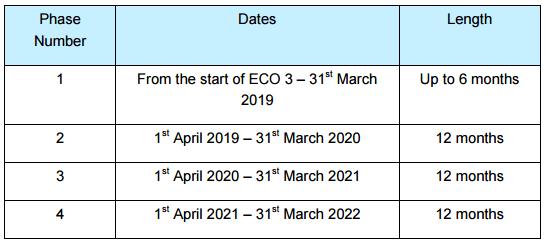ECO3 Consultation - AgilityEco briefing
On 30th March 2018, the government finally issued its long awaited consultation on the future of ECO3. Here are the key highlights together with our thoughts on these proposals. Responses are required by 29th April 2018. We strongly advise all our supply chain and local authority partners to respond to this important consultation.
TIMESCALES & TARGETS
Timescales: ECO3 will run until 31st March 2022 phased as per the table below. It is unclear whether there will be any mechanism to ensure delivery happens in a phased way across these four phases. Without some kind of “soft targets”, there is a risk that compliance actions by suppliers are left until the latter part of the scheme:

What is unclear at this stage is whether the required legislation and guidance will be in place by 1st October 2018. To cater for this BEIS will allow energy suppliers to deliver Affordable Warmth (AW) measures under the current scheme regulations to bridge the gap, with the exception of Oil and Coal fuelled heating systems, which will be removed from ECO3.
Targets: BEIS are proposing a combined AW target of £7.735bn notional bill savings (LTS), which will likely be broken down by phases mentioned above, at an average expected cost of £640m per year in 2017 prices. Solid wall and rural minimum requirements will be as follows:
- 15% Rural minimum – £1.16bn LTS
- SWI minimum - £0.713bn LTS equivalent to 60,000 homes (17,143 per annum).
Supplier carry-over & carry-under: BEIS propose that suppliers be able to carry over an unlimited amount of AW measures subject to new caps and collars on certain measure types with the exception of oil and coal fuelled heating systems which are to be eradicated from the new eligible measures list under ECO3. Interestingly they are also minded to allow a 20% CERO over delivery and award ‘a score based upon the current ECO2t scheme’s deemed scores’.
Carry under is set at a 10% cap with the penalty applied on a 1:1 ratio which essentially is an increase of the equivalent LTS for ECO3 target. Any CERO carry under may costs suppliers more under ECO3 depending on how they convert this in to LTS as mentioned above.
CERO: As previously stated this part of the obligation will completely disappear
ELIGIBILITY
There are three key routes to eligibility:
- Help to Heat group (AW) - private households in receipt of certain means tested benefits. BEIS propose that the AW eligibility criteria be broadened to include a population of 6.5m households versus ~4m now. This expansion will include: removal of income thresholds for most benefits; inclusion of households in receipt of Child Benefit (subject to an income threshold); and inclusion of disability benefits, including Personal Independence Payment.
- Flexible Eligibility: This will increase to a cap of 25% (currently 10%). Flexible Eligibility “infill” will broaden from SWI to other measures (including District Heating).
- Social Housing: It is proposed that insulation or first time central heating (FTCH) measures installed within social housing owned properties with an E, F or G EPC rating are included.
ELIGIBLE MEASURES
HEATING
Gas Heating Replacements: The current (25,000 measures p/a) mains-gas boiler cap will be replaced with a new Broken Heating Cap to include Electric Storage Heating (ESH) and increased to 35,000 (this excludes the installation of First Time Central Heating (FTCH), renewable or district heating systems. To qualify a system must be:
- Broken down and beyond economical repair
- If ESH, at least 50% of the heaters in the property must be broken and beyond economical repair
Inefficient Heating Upgrades: These can now only be delivered alongside certain primary insulation measures and are not included in the Broken Heating Cap. Inefficient heating systems will be defined as:
- non-condensing boilers;
- electric storage heating with a manufactured responsiveness rating of 0.2 or less when assessed against the Standard Assessment Procedure; or
- any other heating where Ofgem deem it to be of a similar efficiency rating to those specified above.
Primary eligible insulation measures will be restricted to:
- flat roof insulation;
- loft insulation (less than 150mm existing);
- rafter insulation;
- room-in-roof insulation;
- wall insulation (insulation of a cavity wall or solid wall insulation);
- insulation of a mobile home; and
- under floor insulation.
Boiler and Electric storage heater repairs: will be limited to 5% of a supplier’s total obligation.
First Time Central Heating (FTCH): This measure will be applicable to both private and social housing including households that are heated by electric storage heaters, which are all inefficient or broken. Again this is not included in the Broken Heating Cap.
District Heating: This looks tough under the proposals in the consultation where District Heating only works under Flexible Eligibility infill rules (E, F, G only plus infill).
Renewable heating systems: Measures which attract RHI will no longer be supported under ECO. So heat pumps and biomass systems will no longer attract ECO funding.
Oil and Coal Fuelled systems – as previously stated will be removed from ECO3 and no carry-over from ECO2t is allowed.
Insulation measures: There are no significant changes to insulation which will be a continuation of the eligible measures under ECO2t.
Solid Wall Insulation (SWI): There will be a smaller SWI minimum (equivalent to 17,000 dwellings, down from 21,000). The fact that all SWI jobs have to be done in HHCRO eligible households eliminates a big portion of the work that has been used in ECO2t – social housing (except where this is E, F or G rated).
INNOVATION
BEIS plan to reintroduce Innovation under ECO3 and propose either a 10% or 20% cap. OFGEM will be responsible for the approval process and suppliers will need pre approval. They will support innovation under three categories:
- Demonstration: for measures which have already been tested in a lab environment to a certain technology readiness level and manufacturers intend to carry out further live tests. Suppliers must have sufficient evidence to support their energy performance claims prior to approval. The cost of live tests will be converted in to lifetime savings
- Innovation score uplifts: providing support for measures that have not previously been delivered under the obligation and have improved installation methods or materials that can drive down costs. This may include smart thermostats.
- In-situ measurement of performance: to encourage a combination of new and innovative measures, on their own or in combination, to be installed in homes and the performance monitored to assess whether this provides increased energy savings compared to the delivery of traditional ECO stand-alone measures. They intend to agree a deemed score in principle based on the suppliers predicted savings and then apply an uplift once the measure has been installed and monitored over a set period. At this stage, the preference is to use National Energy Efficiency Database (NEED) to determine the energy usage before and after improvement works.
INSTALLATION STANDARDS
A new version of PAS (PAS2035) will be introduced and reflected in legislation. This will allow for a more uniform approach based on common industry practices and accreditations. The certification process will ensure that installers are fully equipped to handle the EEM design, install, commission and handover process. The government also intends to introduce a quality standard benchmark resulting from the Each Home Counts (EHC) review. This will be dependent on the specification once the framework is released and may impose further codes of practice for installers.
OUR ASSESSMENT
- We believe BEIS has broadly struck the right balance between re-focusing ECO on the fuel poor and vulnerable keeping costs at a sensible level for energy bill payers.
- The longevity of the scheme is particularly welcome providing greater certainty for everyone.
- How the targets are allocated across the scheme will be important in ensuring that all delivery is not too “back ended”. Without some kind of mechanism of interim targets, there is a risk that much activity will be left until the latter part of the scheme.
- Giving energy suppliers flexibility to deliver AW measures early will help manage the transition to ECO3 and hopefully avoid a hiatus for the supply chain.
- Similarly the proposal to allow energy suppliers to carry-under ECO2t targets to ECO3 is important, as this will reduce unnecessary and unwarranted measure price inflation.
- Expanding the AW eligibility through increasing the cap on Flexible Eligibility will ensure that fewer Fuel Poor and low income/vulnerable households slip through the gap. The increased Flexible Eligibility cap will provide a platform for councils to develop fuel poverty targeted programmes in combination with ECO.
- The removal of oil and coal fuelled systems boilers is welcome.
- A renewed focus on broken heating systems with an increased cap looks to be a positive step. As is the linking of inefficient boiler replacements to insulation measures. This will ensure gas boiler replacements do not dominate the AW obligation as they have done in recent phases of ECO. It’s important to retain the correct balance between heating and insulation which is proven to tackle fuel poverty more efficiently.
- Similarly, allowing ESH replacements in Social Housing must be managed carefully.
- Maintaining a SWI minimum is sensible, although restricting this to HHCRO households may prove stretching without sufficient flexibility for large scale projects. To this extent BEIS are looking for views on whether to maintain a Solid Wall Homes target rather than a Solid Wall Insulation minimum i.e target solid wall homes with other lower cost measures.
- The re-introduction of innovation is positive as its essential new technologies are encouraged in ECO. The process for approving and monitoring innovation needs very careful consideration to ensure we have the right balance of scrutiny and effective delivery.
- It would appear from a first review of the Impact Assessment that the cost assumptions may be very high. With more realistic costs, higher targets could be set, for example a higher SWI Minimum.
AgilityEco will shortly be organising a number of events to share our thoughts with our partners - if you'd like more information on attending one of these events, or have any questions regarding the ECO3 consultation, please email enquiries@agilityeco.co.uk
